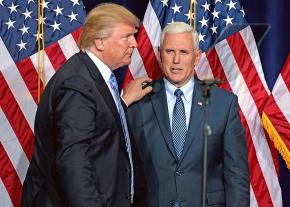Trump’s war on birth control
Donald Trump may have flip-flopped on choose in the past, but his administration is systematically attacking women's reproductive rights, writes .
DONALD TRUMP never missed an opportunity during his presidential campaign to rail against reproductive freedom, including women's rights to abortion and birth control.
And today, he's doing his best to make good on these promises--and in the process is helping to create a climate where women's right to decide what she does with her body is put in peril.
During one particularly horrifying moment of Election 2016, Trump shocked even other anti-choicers at a town-hall-style forum with Chris Matthews of MSNBC when he stated that he believed women who have abortions should face "some form of punishment."
His choice of Indiana Gov. Mike Pence as his running mate further signaled his intent to run on a strongly anti-choice platform. Unlike Trump, who has gone back and forth on supporting abortion throughout his career as CEO-turned-reality-TV-celebrity, Pence spearheaded some of the most extreme anti-choice legislation at the state level during his time as governor.
These include restrictions designed to bar women from seeking abortions related to the race, gender or possible genetic abnormalities of the fetus--a measure that claims to offer protections for people of color and disabled people, but in reality would target these communities in an anti-abortion crackdown.

The outrageous charges of feticide and child neglect leveled against Purvi Patel--an Indiana woman who spent more than a year in prison during Pence's time as governor after seeking medical care following a miscarriage--illustrates all too well how women of color and immigrant communities are among the most vulnerable to far right anti-abortion restrictions.
Today, the assault on reproductive rights is taking the form of the Trump administration's attempt to roll back the birth control mandate associated with the Affordable Care Act (ACA) passed by the Obama administration.
The Obama-era executive order requires that most insurance companies provide full coverage for prescription birth control including pills and other methods. Currently, about 55 million women receive no-cost birth control coverage even if they are not ensured via the ACA.
With Trump in the White House, even this most basic assurance is under attack.
OVER THE last five years a series of lawsuits from religious organizations, universities and businesses have generated pressure for a "religious exemption" status to avoid providing access to contraceptives in employee health care plans.
The most notable of such lawsuits is the Hobby Lobby case, which successfully challenged the mandate on the grounds that individual workplaces can opt out of providing certain reproductive health care deemed to conflict with their religious beliefs.
This disturbing precedent violates basic bodily autonomy by granting employers the power to make health care decisions on behalf of their employees. Similar to Catholic hospitals refusing to offer Plan B and other reproductive services to patients who have survived sexual assault, when reproductive rights come up against so-called religious freedom, there is a pattern of patients losing out.
Trump's early threats to repeal the ACA have many women fearing that they may lose access to their preferred birth control method during his term. So much so, that some women are rushing to get IUDs to prepare for a possible repeal. Planned Parenthood CEO Cecile Richards told CNN that the women's health care provider had seen a 900 percent increase in patients seeking an IUD since the election.
Even if his administration fails to deliver on its promise to "repeal and replace" the ACA, the broader threat has already succeeded in terrorizing patients and emboldening the most militant elements of the anti-choice movement around the country.
The very real possibility that countless individuals could lose access to birth control is an urgent symptom of a failed health care system that places profits before patient's lives.
Without a public option for health care coverage, access to contraception and abortion will continue to hinge on a patient's ability to pay for care and makes it all too easy for the anti-choice movement to attack our rights one loophole or budget cut at a time.
Because the authors of the ACA framed birth control access as a matter of private insurance coverage, rather than a basic right, the law remains vulnerable to contestation at the individual workplace level.
In the Trump era and beyond, pro-choice activists will need to join forces with all who support health care as human right to fight for a system where all forms of reproductive health care are available regardless of employment status or ability to pay.



